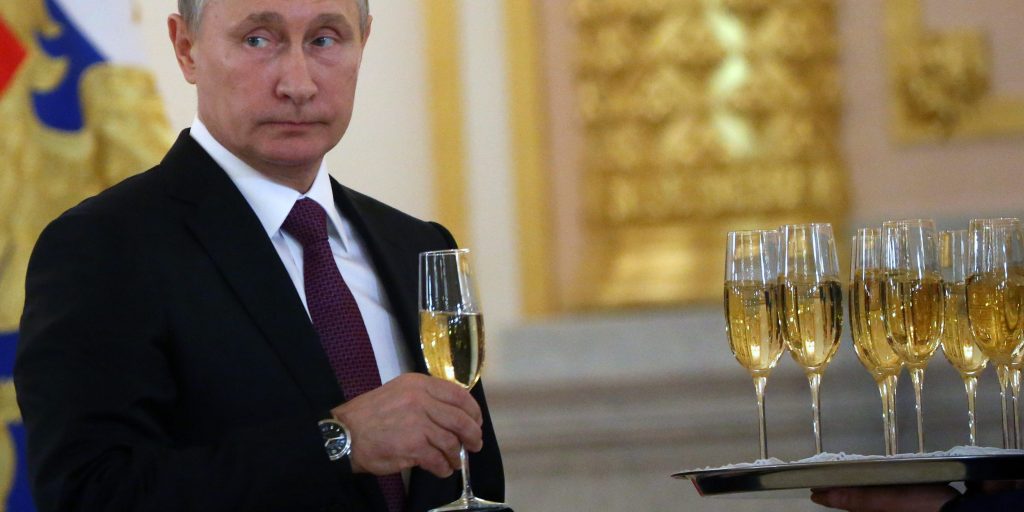- Vladimir Putin plans to force "unfriendly countries" to pay in rubles for Russian natural gas.
- Some have said his plan is a "breach of contract" and a way to skirt Western sanctions.
- Six experts shared their thoughts on Putin's well-timed announcement ahead of a key EU summit.
Vladimir Putin has made it clear: If you want Russian gas, pay in rubles.
The President said on Wednesday that Russia will seek payment in its official currency in exchange for gas sold to "unfriendly" countries.
"I have decided to implement a set of measures to transfer payments for our gas supplies to unfriendly countries into Russian rubles," Putin said in televised remarks.
It isn't clear yet whether Russia has the power to unilaterally change existing contracts already agreed upon in euros.
European gas prices jumped 30% after his announcement, while the struggling ruble briefly rose to a three-week high above 95 against the dollar. The ruble is down more than 22% since Russia's invasion on February 24, and was last at 96.25 against the dollar.
The US and its allies have already imposed a string of sanctions on Russia over its aggression in Ukraine, including blocking it from the SWIFT international payment system, and a ban on energy imports.
The European Union is still deliberating a ban on Russian energy, as the region is heavily reliant on imports. The 27-member bloc gets 40% of its natural gas from Russia, but plans to lower its reliance by two-thirds this year.
While German economy minister Robert Habeck said Putin's announcement would constitute a breach of contract, an economic adviser to Italian Prime Minister Mario Draghi said paying in euros must continue because ruble payments would avoid sanctions.
Here's what 6 experts said about how Putin's 'rubles for gas' plan might work:
1. Vinicius Romano, senior analyst at Rystad Energy
"Gas supply agreements are generally considered sacrosanct: and in an extreme scenario, insisting on ruble payments may give buyers cause to re-open other aspects of their contracts – such as the duration — and simply speed up their exit from Russian gas altogether."
"At face value, this appears to be an attempt to prop up the ruble by compelling gas buyers to buy the previously free-falling currency in order to pay."
2. Paul Donovan, chief economist at UBS Global Wealth Management
"This is a strategy from the playbook of Iraq's Saddam Hussein (without insisting the money is deposited in a French bank). Energy markets remain US dollar-denominated."
"Energy buyers will no longer give Russian energy sellers dollars in the oil and gas market. They will give Russian ruble sellers dollars in the foreign exchange market. Perhaps it makes sanction evasion slightly easier. Otherwise, this is an empty gesture."
3. Per Hammarlund, chief emerging-markets strategist at SEB Research
"By demanding payment in rubles, Putin is forcing Western companies to provide direct support to the Russian currency. The ruble can also receive extra support from companies being forced to buy the ruble in futures to reduce exchange rate risk."
4. Jeffrey Halley, senior market analyst at OANDA
"The devil is in the detail of course, and European importers rightly point out that payment terms in supply contracts are for payment in hard currency, mostly US dollars and euros. Good luck enforcing that, however, with Russia probably likely to reply that the freezing of its currency reserves is illegal as well. As ever, the winners will be armies of lawyers."
5. Marc Ostwald, chief economist at ADM Investor Services
The most likely response by EU nations will see an "agreement to pool purchases, above all to rebuild depleted NatGas stocks, and thus to try and avoid a repetition of the 2021 gas and power price spikes."
6. Ulrich Leuchtmann, head of FX and commodity research, Commerzbank
"Those who have ruble receivables in the West should now be able to get rid of them more easily. Otherwise, rubles will have to be obtained. Directly or indirectly from Russian commercial banks. To get them, you have to give them euros or dollars. In net terms, it will no longer be the accounts of Russian gas exporters that will hold the hard currency amounts, but the accounts of Russian commercial banks. Otherwise, nothing will change."
